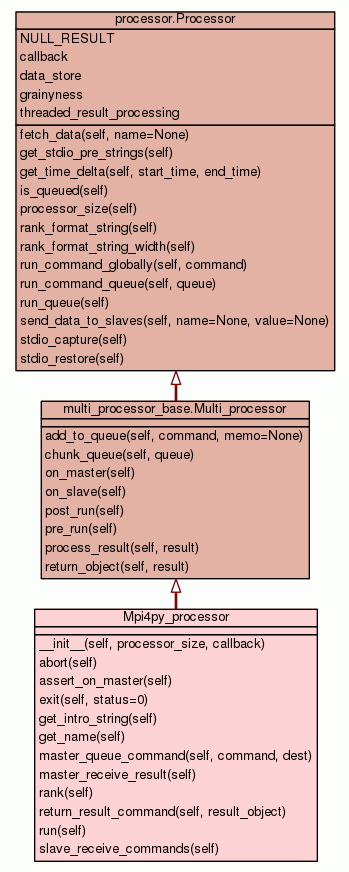
| Trees | Indices | Help |
|
|---|
|
|

The mpi4py multi-processor class.
|
|||
|
|||
|
|||
|
|||
|
|||
|
|||
|
|||
| str |
|
||
| str |
|
||
|
|||
| Result_command instance |
|
||
| int |
|
||
|
|||
|
|||
|
|||
|
Inherited from Inherited from Inherited from |
|||
|
|||
|
Inherited from Inherited from |
|||
|
|||
|
Inherited from |
|||
|
|||
Initialise the mpi4py processor.
|
Shutdown the multi processor in exceptional conditions - designed for overriding. This method is called after an exception from the master or slave has been raised and processed and is responsible for the shutdown of the multi processor fabric and terminating the application. The functions should be called as the last thing that Application_callback.handle_exception does. As an example of the methods use see Mpi4py_processor.abort which calls MPI.COMM_WORLD.Abort() to cleanly shutdown the mpi framework and remove dangling processes. The default action is to call the special self.exit() method.
|
Make sure that this is the master processor and not a slave.
|
Exit the mpi4py processor with the given status.
|
Return the string to append to the end of the relax introduction string.
|
Get the name of the current processor - an abstract method. The string should identify the current master or slave processor uniquely but is purely for information and debugging. For example the mpi implementation uses the string <host-name>-<process-id> whereas the thread implementation uses the id of the current thread as provided by python.
|
Slave to master processor data transfer - send the result command from the slave.
|
Slave to master processor data transfer - receive the result command from the slave. This is invoked by the master processor.
|
Get the rank of this processor - an abstract method. The rank of the processor should be a number between 0 and n where n is the number of slave processors, the rank of 0 is reserved for the master processor.
|
|
Run the processor - an abstract method. This function runs the processor main loop and is called after all processor setup has been completed. It does remote execution setup and teardown (via self.pre_run() and self.post_run()) round either side of a call to Application_callback.init_master.
|
|
| Trees | Indices | Help |
|
|---|
| Generated by Epydoc 3.0.1 on Tue Nov 26 19:04:53 2013 | http://epydoc.sourceforge.net |